Joe's 12 Films That Changed My Life, Part 2
I've noticed a certain look people give me from time to time when I talk movies. It comes from people I know, people I've just met and people who haven't seen me for years. It's a look that says, "What's wrong with you?" and continues, "Why do you waste so much of your life watching movies?"
The answer to that question is one that the I-watch-movies-to-shut-off-my-brain crowd will never really understand. I believe any good movie teaches us things about life and humanity, and each movie we see changes who we are just a little bit. A really good movie will change us at a more profound level, and other movies that may or may not be particularly good might still spark something in us. Even those "It's just a movie" films can tell us things about the people who make them, the people who watch them and the people who might conversely think they're great, important films.
One caveat before we continue: My belief that movies have an impact on us and influence who we are does not mean I think someone watching, for instance, "Friday the 13th" will become a psychotic murderer or a sadistic fiend. That kind of worldview to me is a shallow, baseless interpretation of what movies do to us and is usually the argumentative product of a weak mind. What a good movie does is allow us to walk in the shoes of another person and see the world through their eyes or allow us to see ethics and morals in motion.
I am constantly reminded of Ben Kingsley in "House of Sand and Fog" when he admonishes Americans because they don't care about anything but finding "the next sweet taste in their mouth." How true is that? And what is "A Few Good Men" about besides doing the right thing or what one thinks is the right thing?
But I digress. Here is the second half of the 12 movies that have, in one way or another and for better or worse, have influenced me.
Be sure to check out Part 1!
"Dear Zachary: A Letter to a Son From His Father" (2008)
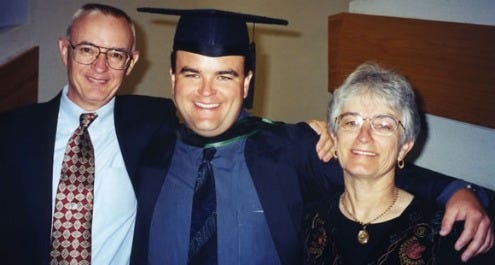
Quite possibly the most heart-wrenching film I've ever seen. It's equal parts examination of the evil of which humanity is capable, harrowing story of love, loss and sacrifice, and indictment on the failures of the American and Canadian judicial systems. "Dear Zachary" is a documentary that started at a sad enough point: Filmmaker Kurt Kuenne's childhood friend Andrew Bagby was shot to death by his ex-girlfriend, who was pregnant with his child. What started as Kuenne's portrait of the father the baby would never know turns into a bitter custody struggle as Bagby's parents seek visitation for the child. Then, well, the film again changes focus when something unspeakable happens. This film offered a greater understanding of the best and the worst of humanity and tells us that even when you have lost everything, there's still a fight to be had.
"Return of the Jedi" (1983)
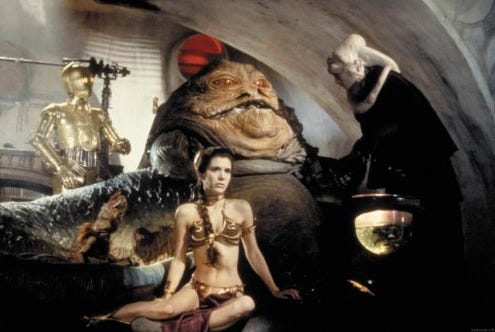
Many "Star Wars" fans would have me tarred and feathered for saying this, but of the six films, this is my favorite. Perhaps it's because it was my first "Star Wars" experience. I was 6 years old when I first saw it in the theater and have never stopped loving it. To this day, it feels like the most fully realized of the films; the characters are more familiar with each other, and there's a great feeling of finality to it all. And yes, I fully embrace the Ewoks as characters in the Star Wars universe, and there are things in this film (like Jabba the Hutt, for instance) that sparked my childhood imagination like I never thought possible. I still remember the excitement I felt sitting in the theater waiting for the movie to start, an excitement that has never waned. "Jedi" is the film that made movies an event for me.
"Jaws" (1975)
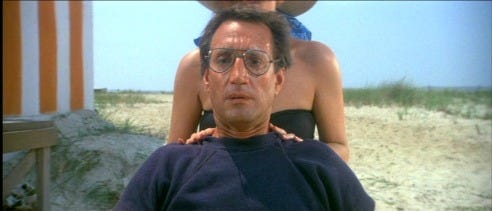
Once again, "Jaws" is not a horror film. It's a drama about middle age that happens to include a man-eating shark. But it's the scariest non-horror film ever made — one that frightened the ever-loving bejeezus out of me as a kid and still does to this day (the scene in the water with Ben Gardner's head gets me every time). But "Jaws" is also the film that taught me how to be a man and a father. For my money, the film's best scene is the one where Brody (Roy Scheider), after a rough day, comes home and sits down at the dinner table to see his son looking at him. Subtly and slyly, Brody begins to mimic what his son is doing until he makes the kid laugh, at which point a still-weary but cheered Brody leans over and asks his son for a kiss. "Why?" the boy asks. "Because I need it," he says. That one scene says that no matter what happens at work during the day — even if there's a man-eating Goliath in the water and man-eating townspeople out of it, all of whom want to dine on your carcass — what matters at the end of the day is that one look from your kids. Plus, you know, sharks and scars and the USS Indianapolis. I count "Jaws" as my single favorite movie of all time.
"Shattered Glass" (2003)
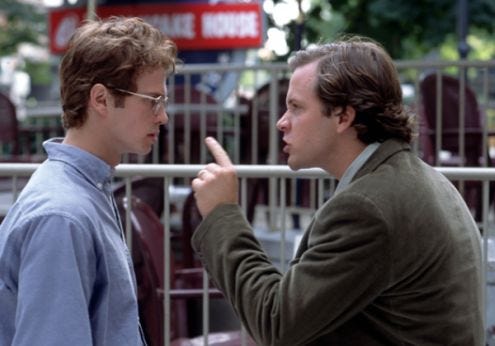
The true story of writer Stephen Glass (Hayden Christensen), "Glass" is a story of atonement and accepting responsibility for your actions. Writer-director Billy Ray turns an already compelling story on its ear and successfully executes a protagonist/antagonist switch. But ultimately this film helped teach me a fundamental truth that as people we so often overlook: Sometimes we have to look at ourselves in the mirror and admit to ourselves that 1) we make mistakes, and 2) those mistakes affect others.
"Robocop" (1987)
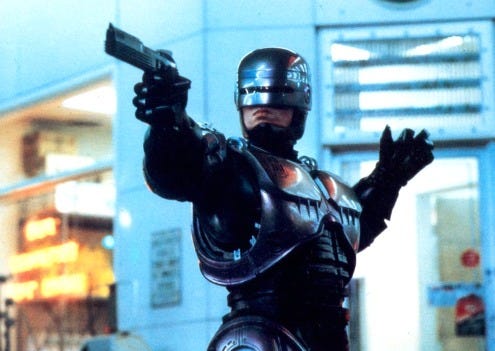
"Robocop" marked a turning point in my life. I was 11 the first time I saw it and was fascinated by everything about it: the science-fiction aspects of creating a cyborg; the corporate bickering and backbiting; the hyperviolence of the movie. Every bullet exploded into flesh, one of my first indications as to the differences between reality and movies like "Rambo," where the hero would unload a machine gun onto a group of people only for them to fall over limply with little blood. "Robocop" lampooned that hero, as Peter Weller's police cyborg was a merciless, junk-blasting killing machine cheered wherever he went (it would have been interesting to see Robocop accidentally kill an innocent person in a sequel; alas, we never got that). "Robocop" also introduced me to the evil corporation that controlled everything (altering my developing political views just this much) and to biting political satire. To a degree, it developed my dark sense of humor. The world today has become what director Paul Verhoeven envisioned with "Robocop."
"Boys Don't Cry" (1999)
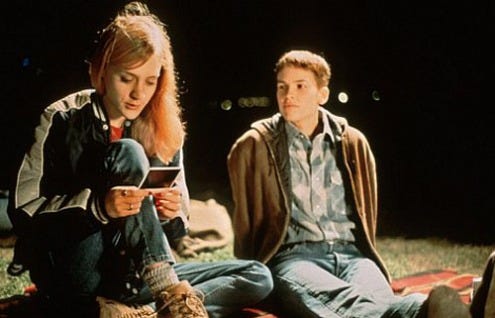
A film that instantly changed my entire worldview. Who hasn't participated in a discussion about a horrific hate crime where someone is beaten, hurt or killed simply for being different, only for some nincompoop to blame that person for having the temerity of not being just like everyone else? "Boys Don't Cry" dares you to say it to his face. "Cry" tells the true story of Brandon Teena, a boy who was born Teena Brandon, a girl. On the verge of finding acceptance as a young man — including finding love with a girlfriend — Brandon is brutally beaten, raped and murdered after being discovered by his best friends. "Cry" doesn't sanctify Brandon, painting him as a troubled young person and not glossing over over his past of passing bad checks for money. But to see what he went through at the hands of his tormentors is often difficult to watch. The wrenching lead-in, where the otherwise likable Brandon yearns for acceptance, is an eye-opening indictment of anyone who has ever directed a hateful word at another person just because they were different.


